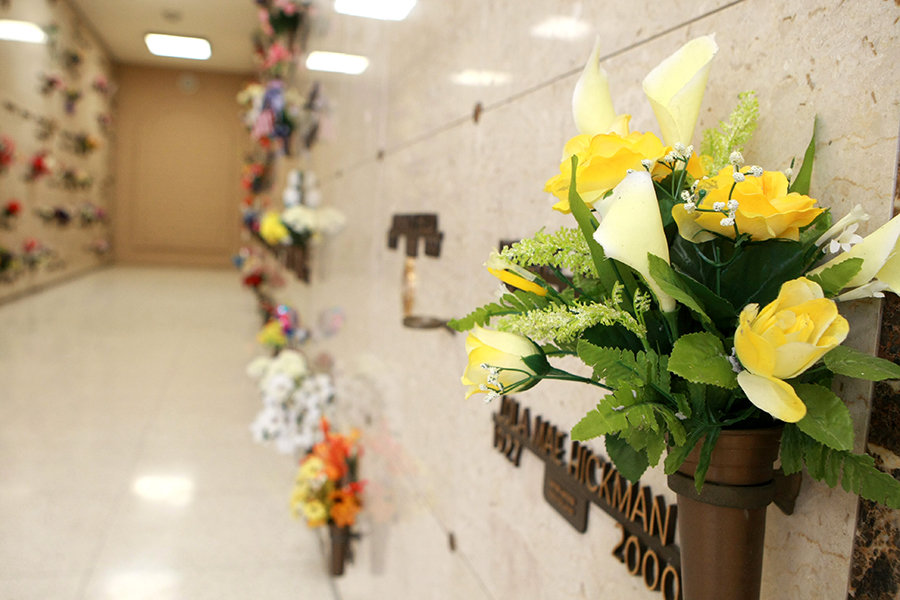Many families are hit hard by the expenses to bury a loved one. Inglewood Park Cemetery has plans that can greatly reduce the cost.
By Blake Carter
Families typically struggle with emotions when dealing with a death of a loved one. For many families, Kevin Simon, a senior memorial councilor at Inglewood Park Cemetery, has seen them leave the cemetery in a furious state after finding out how much it is going to cost to bury their family member. People are not only upset at the cemetery’s pricing, but they are also upset that their lost family member did not take care of this while he or she was still alive.
“When a loved one goes, you’re going to be sad,” Simon said. “That’s what you want to be. We want you to be able to be sad when a loved one is gone. Not mad. When somebody has left you a large bill unexpectedly, even if it’s a loved one, you don’t have time to be sad. You’ve got to find some money. If your family member took care of it in advance, you can just be sad instead of mad too.”
Simon works in the Family Services department, where he sets people up on monthly plans for their cemetery costs. That way, people do not pass the expenses on to their family. But many people do not want to deal with the idea of their own death, or planning for it. For some people, they view it as somebody else’s problem.
“At the end of the day, when you’re dead, it’s not your problem anymore,” Simon said. “I’m really working hard to get people away from that type of thinking. Yes you are dead, and you don’t have anymore problems. But you don’t want to leave these problems to your family, especially when you can just pay $50 a month and be protected. Pre-need services makes all the sense. It’s your terms, your time to pay for it, and you’re not leaving this for your family at the worst time of their life. Pre-need services just makes it easier.”
Without pre-need services, many families are left scrambling to come up with a large sum of money in a very short period of time to pay for cemetery services. Some people set up GoFundMe pages, and others take to the streets to seek donations from people at traffic stop lights.
“You’re not only putting your surviving family members in a bad position, you’re leaving them to embarrassment,” Simon said. “The best case scenario is to pass the hat around to your own family. People will give you a hundred bucks here or there, but to put somebody away decently, we’re talking $8,000-$10,000. Who has $10,000 just sitting around? Some do, and if you’re lucky enough you’ll have a family member who can put up the money.”
For people who do not pay for the services before their death, their family members will have to pay full value because the cemetery does not have a need to work out a good price. The family is pretty much stuck paying for the price that the cemetery quotes, and they have to come up with that money in a matter of days. Simon believes that every family should own cemetery property to avoid this problem.
“When you get the pre-need services, we can offer discounts and rebates,” he said. “But once you wait until somebody dies, all bets are off. There’s no reason to offer you any discounts or rebates. And you’re paying everything at once.”
Pre-need services are much cheaper than at-need services because the cemeteries have more of a need to work with people who do not have an immediate need. Most plans can be paid off in seven years, and Simon said that many people pay it off early. Some people pay it off before the interest period begins.
Simon speaks at a lot of wealth management seminars, where he advises people not to use life insurance to bury family members.
“That’s one thing that’s setting us back,” he said. “I tell people, if you have life insurance, great, but life insurance isn’t designed to bury people. That’s another cultural thing that we have to get over. I was talking to a Jewish CPA, and I was telling her that Black folks use life insurance to bury folks. She says, ‘You’re kidding!’ Life insurance is exactly what it says. Life insurance. It’s for the living. It’s so that when daddy passes away, the kids don’t have to live like paupers because his income is gone. Or because they had to use $10,000 of the insurance to bury him. Let your life insurance go to the living, so that the family can continue paying the mortgage, and continue living like they were before the death.”
Simon also points out that the time frame in receiving the money from the life insurance policy is an issue.
“They’re not going to pay anything until they get the death certificate,” he said. “That usually takes about 21 to 30 days. Meanwhile your body is sitting in somebody’s mortuary, paying a daily rate for storage like you’re staying at the Ritz Carlton. When your life insurance does show up in 30 days, 30 times $100, you’ve paid $3,000 in storage fees.”
Also factor in that cemetery prices are similar to real estate prices, which are dramatically rising. Simon’s mother passes away last year. She purchased her property at Inglewood Park Cemetery in 1983. Simon said that if she had not taken care of that years ago, he and his brother would of had to take on that financial burden, and that it would have cost them three times the price that she paid decades ago.
For more information about pre-need services, visit www.inglewoodparkcemetery.com or contact Simon at (310) 344-5201 cell, (323) 455-1945 office, or This email address is being protected from spambots. You need JavaScript enabled to view it..











